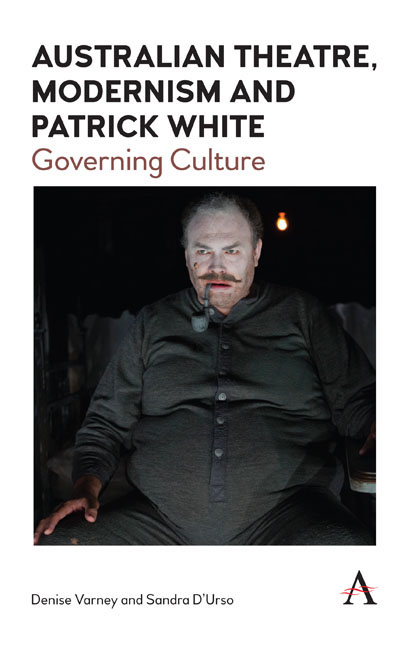Book contents
- Frontmatter
- Contents
- List of Illustrations
- Acknowledgements
- Introduction
- 1 The Archive, Governance and Sovereignty
- 2 ‘Words Fail Me’: The Ham Funeral and the 1962 Adelaide Festival
- 3 Night on Bald Mountain and the 1964 Adelaide Festival
- 4 The ‘Clowns’ Who ‘Cling to the Past’: A Sovereign Decision and the Practice of Exclusion
- 5 The Sovereignty of the Plays and Opportunities for New Publics
- Index
Introduction
Published online by Cambridge University Press: 29 May 2019
- Frontmatter
- Contents
- List of Illustrations
- Acknowledgements
- Introduction
- 1 The Archive, Governance and Sovereignty
- 2 ‘Words Fail Me’: The Ham Funeral and the 1962 Adelaide Festival
- 3 Night on Bald Mountain and the 1964 Adelaide Festival
- 4 The ‘Clowns’ Who ‘Cling to the Past’: A Sovereign Decision and the Practice of Exclusion
- 5 The Sovereignty of the Plays and Opportunities for New Publics
- Index
Summary
In March 2012, the Adelaide Festival of Arts staged an exuberant steampunk version of Patrick White's comic play The Ham Funeral, originally written in London in 1947 and first performed in Adelaide in 1961. The 2012 production celebrated the centenary of the writer's birth and marked 50 years since the Board of Governors of the 1962 Adelaide Festival had refused to stage the play's world premiere. Amid claims of philistinism, paternalism and amateurism, the Board had determined that the play's unsavoury themes, modernist form and poor box-office outlook made it unsuitable for a festival production. In recognition of the troubled history between the Adelaide Festival and White, 2012 Artistic Director Paul Grabowsky announced that the new production, directed by Adam Cook, would pay ‘tribute to our Nobel Laureate’ and finally see ‘unfinished business finished’. The Festival production, presented by the State Theatre Company of South Australia, made amends with a dazzling interpretation that drew out the flamboyant theatricality, humour and pathos of the play (Figure 0.1).
In May 2014, Melbourne's Malthouse Theatre staged White's ambitious and challenging modernist drama, Night on Bald Mountain, written between 1963 and 1964. As was the case with The Ham Funeral two years earlier, the world premiere of Night on Bald Mountain was rejected by the Board of Governors for the 1964 Adelaide Festival and took place instead at the University of Adelaide's Union Hall theatre. At the Malthouse Theatre 50 years later, director Matthew Lutton's production earned high praise for its ‘truthful and scrupulously faithful version that gathers immense power as it unfolds’. The 2014 revival introduced contemporary audiences and critics to a little-known play whose complexity and startling symbolic imagery and language were brought to life by the creative team, who drew out the modernist aesthetic from the play's naturalist veneer. The combined effect of satire and symbolism was a masterful realization of the nascent brilliance of White's writing for theatre (Figure 0.2).
These two recent productions followed the stylish Sydney Theatre Company production of White's second play, The Season at Sarsaparilla (first performed in 1962) in 2007. Director Benedict Andrews made extensive use of live streaming video cameras and screens to reinterpret the text by means of contemporary intermedial theatre.
- Type
- Chapter
- Information
- Australian Theatre, Modernism and Patrick WhiteGoverning Culture, pp. 1 - 16Publisher: Anthem PressPrint publication year: 2018



